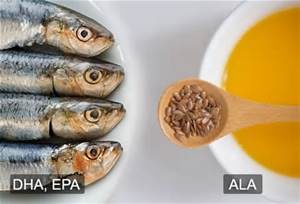Adapted from Adda Bjarnadottir, MS |
Image courtesy fanaticcook.blogspot.com
DHA has many, many health benefits.
It is a part of every single cell in the body, is vital for the brain and is absolutely crucial during pregnancy and infancy. DHA makes up over 90% of the omega-3 fatty acids in the brain and up to 25% of its total fat content.
What is DHA?
DHA is a long-chain omega-3 fatty acid and is mainly found in seafood, such as salmon, mackerel, sardines, herring, shellfish, fish oils and some types of algae.
It can be synthesized from another plant-based omega-3 fatty acid called alpha-linolenic acid (ALA), found in flaxseeds and walnuts. However, this process is very inefficient, and only 0.1–0.5% of ALA is converted into DHA in your body. What’s more, the conversion also relies on adequate levels of other vitamins and minerals, as well as the amount of omega-6 fatty acids in the diet. This is why a vegetarian source for DHA is inadequate.
How Does it Work?
DHA is mainly located in cell membranes, where it makes the membranes and gaps between cells more fluid. This makes it easier for cells to send and receive electrical signals, which is their way of communicating. Therefore, adequate levels of DHA seem to make it easier, quicker and more efficient for cells to communicate.
Low levels in the brain or eyes may slow the signaling between cells, resulting in poor eyesight or altered brain function.
Effects on the Brain
DHA is essential for brain and eye development. A deficiency in early life is linked to learning disabilities, ADHD and other disorders.
A DHA deficiency may disrupt brain function. Supplements may improve memory, learning and verbal fluency in the elderly.Low Levels are also linked to mental health conditions.
Alzheimer’s disease is the most common form of dementia in older people. Low DHA levels are linked to an increased risk of developing memory complaints, dementia and Alzheimer’s disease.
DHA is important for vision and various functions inside the eye. A deficiency may cause vision problems in children.
Effects on Heart Health
Their intake can improve many risk factors for heart disease, including:
- Triglycerides: Long-chain omega-3 fatty acids may reduce blood triglycerides by up to 30%.
- Blood pressure: They may help reduce high blood pressure.
- Cholesterol levels: They may lower total cholesterol and increase HDL cholesterol.
- Endothelial function: DHA may protect against endothelial dysfunction, which is a leading driver of heart disease.
Other Health Benefits
DHA may also protect against the development of other diseases, including:
- Arthritis: It reduces inflammation in the body and may alleviate the pain and inflammation in the joints of people with arthritis.
- Cancer: It may make it more difficult for cancer cells to survive. It may also cause them to die via programmed cell death.
- Asthma: It may reduce asthma symptoms, possibly by blocking mucus secretion and reducing allergic reaction.
DHA is Especially Important During Pregnancy, Lactation and Childhood
DHA is critical during the last months of pregnancy and early in a baby’s life.
Babies up to the age of two have a greater need for it than older children and adults. Their brains are growing rapidly, and need high amounts of DHA to form vital cell membrane structures in the brain and eyes. Therefore, DHA intake can dramatically affect brain development.
Animal studies show that DHA-deficient diets during pregnancy, lactation and weaning limit the supply to the infant’s brain to only about 20% of normal levels. Deficiency is associated with changes in brain function, including learning disabilities, changes in gene expression and impaired vision.
How Much DHA Do You Need?
Most guidelines for healthy adults recommend at least 250–500 mg of combined EPA and DHA per day.
Children up to the age of two may need 10–12 mg/kg of body weight, while older children may need up to 250 mg per day.
Pregnant or breastfeeding mothers are advised to get at least 200 mg of DHA, or 300–900 mg of combined EPA and DHA, per day.
People with mild memory complaints or cognitive impairments need 500–1,700 mg of DHA per day to improve brain function.
Vegetarians and vegans are often lacking in DHA and should consider taking microalgae supplements that contain DHA.
Possible Adverse Effects
DHA supplements are usually well tolerated, even in large doses. However, omega-3s are generally anti-inflammatory and may thin the blood. If you are planning surgery, you should stop supplementing with omega-3 fatty acids a week or two beforehand.



